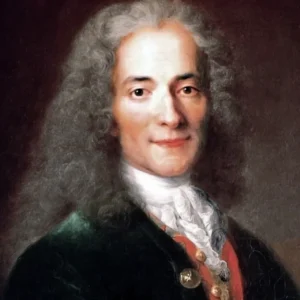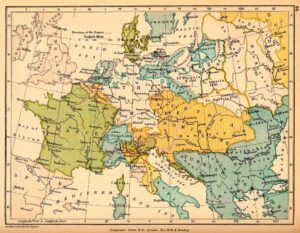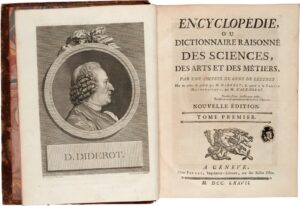
I’m taking a bit of a different turn on the blog today. Alongside art and the art business, I love reading – from artist biographies and art history to a mix of world history, philosophy, science, and even some science fiction and business books. This diverse reading has always played a part in how I see and understand art and the world more broadly.
I’m excited to introduce a new series of blog posts where I’ll share insights and summaries from the various books I read each year. A special part of my annual reading ritual includes reading from “The Story of Civilization” series by Will and Ariel Durant. Over the last nine years, I’ve been reading one book from this series every year, along with other books. While I’m aware that some consider the series outdated, I inherited these books and have found Durant’s writing to be both engaging and enjoyable. This year, my focus was on the ninth book, “The Age of Voltaire: A History of Civilization in Western Europe from 1715 to 1756,” which offers an insightful look at the interplay between religion and philosophy during this transformative era.
Summary
Introduction: “The Age of Voltaire” offers a profound exploration of Western Europe from 1715 to 1756. This period, a cornerstone in the Enlightenment, witnesses a significant clash between established religious dogmas and burgeoning philosophical thought. Central to this narrative is Voltaire, an emblematic figure whose life and works encapsulate the essence of this transformative era.
Voltaire – The Protagonist:

Early Life and Education: Born François Marie Arouet on November 21, 1694, in Paris, Voltaire was the youngest of five children in a middle-class family. He received his early education at the Jesuit Collège Louis-le-Grand, where he was introduced to classic literature and developed a sharp wit and a love for literature and theatre.
First Imprisonments and Exiles: Voltaire’s journey was marked by frequent conflicts with the authorities, leading to numerous imprisonments and exiles. His first stint in the Bastille in 1717 was due to his satirical verses that mocked the French Regent. This imprisonment, however, didn’t dampen his spirit; it was during this time he adopted the name “Voltaire.”
Literary Successes and Philosophical Development: After his release, Voltaire’s literary career blossomed. He wrote plays, poetry, and historical works that gained him fame and controversy. His sharp criticism of the church and state, especially in works like “Letters on the English” (1733), displayed his growing interest in philosophy, politics, and the burgeoning Enlightenment ideals.
Exile in England: Voltaire’s second major exile was to England (1726-1729), a period that profoundly influenced his thinking. He was impressed by England’s constitutional government, its religious tolerance, and the works of Newton and Locke. This experience greatly shaped his later philosophical and political ideas.
Cirey Period and Relationship with Émilie du Châtelet: Returning to France, Voltaire spent much of the 1730s and 1740s in a passionate and intellectual partnership with the brilliant mathematician and physicist Émilie du Châtelet at her estate in Cirey. This period was marked by significant intellectual productivity, including works on science and philosophy.
Philosophical Works and Advocacy: Voltaire’s later years were devoted to writing and advocacy. His most famous work, “Candide” (1759), is a satirical novel that criticizes the optimistic philosophy of the day. He was a staunch defender of civil liberties and spoke against the injustices of the church and state, including the wrongful execution of Jean Calas.
Ferney and Later Life: In 1758, Voltaire moved to Ferney, near the French-Swiss border, where he played a significant role as a farmer, local benefactor, and a patron of the arts. He continued his writing, focusing on history, philosophy, and politics, and became a revered figure among Enlightenment thinkers.
Return to Paris and Death: In 1778, Voltaire returned to Paris, where he was welcomed as a hero. However, his health was failing, and he died on May 30, 1778. His death marked the end of an era and the loss of one of the Enlightenment’s most influential and provocative voices.
Throughout his life, Voltaire’s contributions to literature, philosophy, and the fight for social justice and religious tolerance cemented his legacy as a key figure in shaping modern thought.
Voltaire’s World
Share Your Thoughts
Durant’s series presents a captivating blend of detailed history and engaging storytelling. It’s been an insightful experience, traversing different eras and discovering their connections to our present day. I’m eager to hear from you – have you explored any of the Durant’s works or books that cover this period? What book are you currently enjoying? Please share your thoughts in the comments below.


Fascinating! Such a timely commentary on freedom of religion, freedom of speech and separation of church and state. I just read an article this morning in parents.com that address Voltaire and his influence on todays western world anyway. Great. Thank you for sharing!!!
Thank you Jason, I would be willing to bet that the majority of folks reading this had never heard of Voltaire or any of the history of the time that you so capably synopsized. Unless of course they majored in literature in college. I have always loved history and am grateful that growing up as a young man I lived in England as a young boy, then spent eight years in Canada, before we finally immigrated to the US and to southern California in my teens. I received a much more rounded history and education that way, before going on to college. Thanks for stepping out and providing a different and educational read.
I have to admit that prior to reading this volume, I was among those unaware of Voltaire – pretty amazing, considering he has to be one of the most influential authors/philosophers who have ever lived.
Perhaps we need a Voltaire.2.0.?! Reason? Empirical evidence? Rational thought? These concepts seem to be often absent or obscured. While we are no longer subjected to royal tyrants, one wonders if corporations have become our new rulers, and societal rights, freedoms, safety and privacies have been sacrificed. Vigilance is key. Or maybe there’s many more voices now at the table, and it’s harder to make sense of it all. Or perhaps it’s always difficult to ‘code’ the world we live in. And heavens knows a little humour always helps.
Agreed! 🙂
My husband has been reading to me from these volumes for many years. He first discovered them (40 years ago?) when a history book club gave them as a gift when you joined their club. The are many used full sets available online because of this.
“Enlightenment ideas were highly embodied in the Declaration of Independence and the US Constitution. The major enlightenment ideas highlighted that each and every citizen has the right to reason, autonomy, and the notion that all human beings are equal by nature”, (my comment) although ironically slavery was ignored.